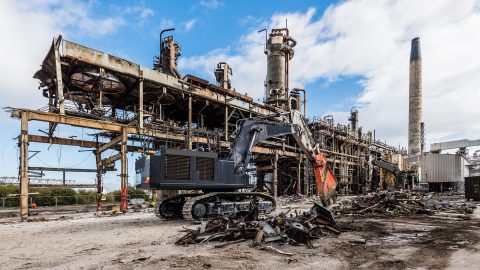In case you missed the news, RVA Group collaborated with petrochemical giant SABIC at its Teesside facilities throughout a decade-long decommissioning project.
Catch up with Tees Business below.
SABIC clears way for potential investment projects as a decade of decommissioning activity draws to a close
A complex 10-year demolition programme across SABIC’s Teesside facilities has freed up swathes of land for future industrial development.
Ten of the global petrochemical giant’s plant areas spanning 54 hectares – the equivalent of 270 football pitches – have been cleared on land that could eventually bring new jobs into the area via other interested parties keen to be part of Teesside’s ongoing regeneration.
Prior to the regeneration of the massive Teesworks site, it was Europe’s largest demolition project.
Now, after more than a decade of dedicated decommissioning work involving hundreds of people from across the North-East and beyond, the removal of SABIC’s redundant Teesside plant and pipeline infrastructure across two major industrial sites will finally be completed by the end of the year.
The vast and complex network occupied huge swathes of the 2,000-acre Wilton International site and included important SABIC facilities at the North Tees site too.
The top priority in completing the work was, of course, the safety of everyone associated with the project, plus those working for companies at neighbouring facilities and not least the surrounding public.
That meant every aspect of the work had to be planned in advance and executed meticulously to ensure that any risk was minimised. With many plant structures the size of multi-storey buildings and pipelines potentially still containing a myriad of hazardous gases and liquids, those risks were many.
Happily, over the course of the decade, over 1.2 million safe hours of work has passed – a truly world class safety performance.
Despite the complexity of this vast undertaking and the sheer volume of work carried out, the project has remained on track and has been delivered under budget.
Matthew Waller, operations director of the engineering consultancy RVA Group, tasked with designing and project managing the work of the six different contractor firms executing the work, said: “This has been an intricate, extensive, and high-profile demolition programme – part of SABIC’s investment in ‘fit for the future’ operations. We have continued to sequentially remove redundant plant from their footprint to pave the way for their ongoing manufacturing excellence, and it has been a privilege to support them over the course of the last ten years.”
Keiron Mulholland, SABIC’s senior demolition manager, said: “The focus for this entire project has been safe execution by design. Detailed planning and expert decommissioning engineering have been the foundations for the safe delivery of this project from start to finish – no mean feat given the inherently high-hazard nature of the works and the sheer number of hours invested into the programme.
“The team from RVA worked collaboratively with both the SABIC team and all of the Principal Contractors to meet the project business drivers of an excellent EHS performance, within the sanctioned budget and in line with the agreed schedule – a marvellous achievement and one everyone involved in the project should be proud of.”
The scale and complexity of the job is apparent in the statistics:
- The demolition of two of the largest distillation columns in Europe at 110m
- The dismantling of a further 25 columns and three chimney stacks reaching up to 125m
- Removal of 11 cooling towers pulse 50 furnaces, six spheres and more than 100 storage tanks
- Demolition of a jetty on the River Tees – a job which required huge environmental care with the Teesmouth National Nature Reserve – home to a variety of protected bird and river species and designated a Site of Special Scientific Interest – close by.
- The retrieval and salvage of 58,500 tonnes of scrap metal
- The removal of 44,000 tonnes of additional waste including 8,750 tonnes of asbestos
- All waste managed responsibly and in line with the waste hierarchy resulting in an overall project recycling rate of 98 per cent
For SABIC, the benefits in carrying out the work were obvious. Continuing to manage redundant infrastructure was a time consuming and costly exercise and with assets slowly deteriorating year by year the chances of safety, health or environment issues increased.
However, there were other spin off benefits that meant the success of the project had wider implications.
In terms of the continued economic health of Teesside, the work not only created work for those involved in the various aspects of the job, but also freed up valuable land at Wilton and North Tees for future industrial development – land that could eventually bring new jobs into the area via new investors.
The attraction of the land to those investors is obvious and few locations in Britain compare with Teesside as a location for heavy industrial development. Reliable and easy to access supplies of low carbon energy and raw material feedstocks combine with our unparalleled industrial infrastructure, the “jewel” that is our deep water port and not least the area’s engineering and process expertise to tempt investors.
Not surprising then that the existing industrial sites on Teesside have seen an upsurge of enquiries from potential investors in recent years with many keen to bring multi-million pound developments to the sites that will boost Britain’s desire to move towards a net zero carbon future.
The benefits of the work extend to the wider community too.
From the start one of the ways SABIC tried to ensure that safety remained the top priority was by implementing a scheme that ensured that every safe working day completed would benefit a local charity or good cause.
As a result, thousands of pounds have been distributed across the Teesside area, adding to the tens of thousands that SABIC donates to charities and causes in the area annually.
That aspect of the business will be explored in a future edition of Tees Business.









